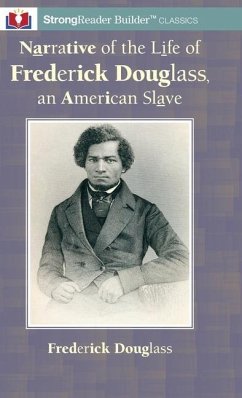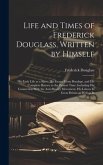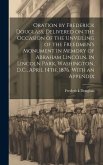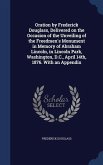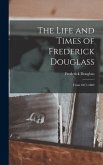Frederick Douglass
Narrative of the Life of Frederick Douglass, an American Slave
A StrongReader Builder(TM) Classic for Dyslexic and Struggling Readers
23,99 €
inkl. MwSt.
Versandfertig in über 4 Wochen

12 °P sammeln
Frederick Douglass
Narrative of the Life of Frederick Douglass, an American Slave
A StrongReader Builder(TM) Classic for Dyslexic and Struggling Readers
- Gebundenes Buch
- Merkliste
- Auf die Merkliste
- Bewerten Bewerten
- Teilen
- Produkt teilen
- Produkterinnerung
- Produkterinnerung
This original version of Narrative of the Life of Frederick Douglass is published in Noah Text(R), a proprietary method of presenting text that helps dyslexics and struggling readers read more fluently, enhancing their comprehension.
Andere Kunden interessierten sich auch für
![Life and Times of Frederick Douglass, Written by Himself: His Early Life as a Slave, His Escape From Bondage, and His Complete History to the Present Life and Times of Frederick Douglass, Written by Himself: His Early Life as a Slave, His Escape From Bondage, and His Complete History to the Present]() Frederick DouglassLife and Times of Frederick Douglass, Written by Himself: His Early Life as a Slave, His Escape From Bondage, and His Complete History to the Present43,99 €
Frederick DouglassLife and Times of Frederick Douglass, Written by Himself: His Early Life as a Slave, His Escape From Bondage, and His Complete History to the Present43,99 €![Life and Times of Frederick Douglass, Written by Himself Life and Times of Frederick Douglass, Written by Himself]() Frederick DouglassLife and Times of Frederick Douglass, Written by Himself43,99 €
Frederick DouglassLife and Times of Frederick Douglass, Written by Himself43,99 €![Oration by Frederick Douglass, Delivered on the Occasion of the Unveiling of the Freedmen's Monument in Memory of Abraham Lincoln, in Lincoln Park, Washington, D.C., April 14th, 1876. With an Appendix Oration by Frederick Douglass, Delivered on the Occasion of the Unveiling of the Freedmen's Monument in Memory of Abraham Lincoln, in Lincoln Park, Washington, D.C., April 14th, 1876. With an Appendix]() Frederick DouglassOration by Frederick Douglass, Delivered on the Occasion of the Unveiling of the Freedmen's Monument in Memory of Abraham Lincoln, in Lincoln Park, Washington, D.C., April 14th, 1876. With an Appendix28,99 €
Frederick DouglassOration by Frederick Douglass, Delivered on the Occasion of the Unveiling of the Freedmen's Monument in Memory of Abraham Lincoln, in Lincoln Park, Washington, D.C., April 14th, 1876. With an Appendix28,99 €![Oration by Frederick Douglass, Delivered on the Occasion of the Unveiling of the Freedmen's Monument in Memory of Abraham Lincoln, in Lincoln Park, Washington, D.C., April 14th, 1876. With an Appendix Oration by Frederick Douglass, Delivered on the Occasion of the Unveiling of the Freedmen's Monument in Memory of Abraham Lincoln, in Lincoln Park, Washington, D.C., April 14th, 1876. With an Appendix]() Frederick DouglassOration by Frederick Douglass, Delivered on the Occasion of the Unveiling of the Freedmen's Monument in Memory of Abraham Lincoln, in Lincoln Park, Washington, D.C., April 14th, 1876. With an Appendix28,99 €
Frederick DouglassOration by Frederick Douglass, Delivered on the Occasion of the Unveiling of the Freedmen's Monument in Memory of Abraham Lincoln, in Lincoln Park, Washington, D.C., April 14th, 1876. With an Appendix28,99 €![The Personal Narrative Of Mrs. Margaret Douglass, A Southern Woman, The Personal Narrative Of Mrs. Margaret Douglass, A Southern Woman,]() Douglass Margaret CrittendenThe Personal Narrative Of Mrs. Margaret Douglass, A Southern Woman,31,99 €
Douglass Margaret CrittendenThe Personal Narrative Of Mrs. Margaret Douglass, A Southern Woman,31,99 €![Narrative of the Life of Frederick Douglass Narrative of the Life of Frederick Douglass]() Frederick DouglassNarrative of the Life of Frederick Douglass16,99 €
Frederick DouglassNarrative of the Life of Frederick Douglass16,99 €![The Life and Times of Frederick Douglass: From 1817-1882 The Life and Times of Frederick Douglass: From 1817-1882]() Frederick DouglassThe Life and Times of Frederick Douglass: From 1817-188241,99 €
Frederick DouglassThe Life and Times of Frederick Douglass: From 1817-188241,99 €-
-
-
This original version of Narrative of the Life of Frederick Douglass is published in Noah Text(R), a proprietary method of presenting text that helps dyslexics and struggling readers read more fluently, enhancing their comprehension.
Produktdetails
- Produktdetails
- Verlag: BNC Books
- Seitenzahl: 202
- Erscheinungstermin: 20. August 2023
- Englisch
- Abmessung: 216mm x 140mm x 16mm
- Gewicht: 404g
- ISBN-13: 9781956944174
- ISBN-10: 1956944176
- Artikelnr.: 68989346
- Verlag: BNC Books
- Seitenzahl: 202
- Erscheinungstermin: 20. August 2023
- Englisch
- Abmessung: 216mm x 140mm x 16mm
- Gewicht: 404g
- ISBN-13: 9781956944174
- ISBN-10: 1956944176
- Artikelnr.: 68989346
Frederick Douglass was a writer, orator, abolitionist, and statesman whose given name was Frederick Augustus Washington Bailey. Born a slave in Maryland in 1817, he managed to escape and went on to become a leader of the abolitionist movement in New York and Massachusetts. He became famous for his antislavery writings and speeches and was a living counterargument against the belief that slaves could not function as full-fledged citizens. Even Northerners had trouble believing that this great writer and public speaker had been born into slavery. Douglass described his experiences as a slave in his Narrative of the Life of Frederick Douglass, an American Slave, published in 1845. This bestselling book, which was followed 10 years later by a second book entitled My Bondage and My Freedom, helped promote the abolitionists' cause. After the Civil War, Douglass was a strong advocate for the rights of freed slaves. His last autobiographical book, Life and Times of Frederick Douglass, was initially published in 1881 and revised a year later. Throughout the Reconstruction era, Douglass continued speaking and advocating for voting rights, not only for freed slaves but also for women. In 1872 he was nominated, without his permission, to run for Vice President of the United States as Victoria Woodhull's running mate on the Equal Rights Party ticket. He never acknowledged that he had been nominated, nor did he campaign. That same year, he was presidential elector-at-large for New York State, taking that state's electoral votes to Washington, D.C. After Douglass's home in Rochester, NY, burned down in June of 1872, he moved to Washington, DC. At the 1888 Republican National Convention, Douglass became the first African-American to receive a roll call vote from a major political party for President of the United States. On February 20, 1895, Douglass attended a National Council of Women meeting in Washington, where he was brought to the platform and received a standing ovation. Later that same day, after he had gone home, Douglass died of a massive heart attack at the age of 77.
